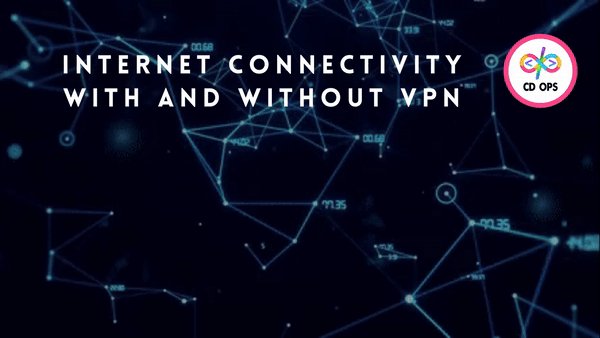
Navigating the Digital Realm: Unveiling the Dynamics of Internet Connectivity with and without VPN
Introduction:
In the digital age, how we connect to the internet matters. Whether for privacy or accessing restricted content, Virtual Private Networks (VPNs) have gained popularity. This blog explores the dynamics of internet connectivity, highlighting the differences between connecting with and without a VPN.
Understanding Internet Connectivity:
Connecting without VPN:
★ Unveiling the Basics:
Traditionally, your ISP will provide you with a public IP address, which can be used to connect directly to the internet. Then you can able to exchange the packets through request response method. Even though we have SSL concepts, your IP address will be exposed here.
★ Potential Risks:
Two main security concerns are, Unencrypted data sometimes exposes sensitive information and your ISPs can monitor and track your online activities.

Connecting with VPN:
★ How VPNs Ensure Privacy:
After enabling VPN, you will connected to a specific VPN server and all your surfings, and packets will be encrypted and routed through the VPN server from and to internet.
VPNs use advanced encryption protocols, such as AES, to secure data during transmission. This ensures that even if intercepted, the data remains unreadable to unauthorized entities.
Reputable VPN services adhere to a strict no-log policy, meaning they don’t store user activity data. This commitment to privacy adds an extra layer of assurance for users concerned about data logging.
★ Mitigating Cyber Threats:
VPNs act as a shield against various cyber threats, including man-in-the-middle attacks and phishing attempts.
The encrypted tunnel prevents unauthorized access and ensures the integrity of your online communications.
★ Business Applications:
a. Remote Work Security:
- VPNs are integral for remote workers accessing company networks.
- The encrypted connection ensures secure access to sensitive corporate data from any location.
b. Confidential Communication:
- Businesses often use VPNs for secure communication between offices, ensuring confidentiality and integrity of sensitive information.

Pros of Using a VPN:
1. Privacy Protection:
- Anonymous Browsing: VPNs make it challenging to trace your online activities.
- Location Anonymity: Access region-restricted content by masking your location.
2. Enhanced Security:
- Secure Transactions: VPNs add a layer of security to online transactions.
Cons of Using a VPN:
1. Reduced Speed:
- Overhead of Encryption: VPNs may slow down internet speeds.
2. Legality and Accessibility:
- Legal Restrictions: Some countries restrict VPN use.
- Blocked Services: Some platforms may block VPN users.
Conclusion:
In the dynamic landscape of internet connectivity, understanding the pros and cons of VPNs versus direct connections empowers users to make informed decisions for a secure and personalized online experience.
Thanks for checking out this writup. You can ping cdops1official@gmail.com to give feedback or any content inaccuracy.
